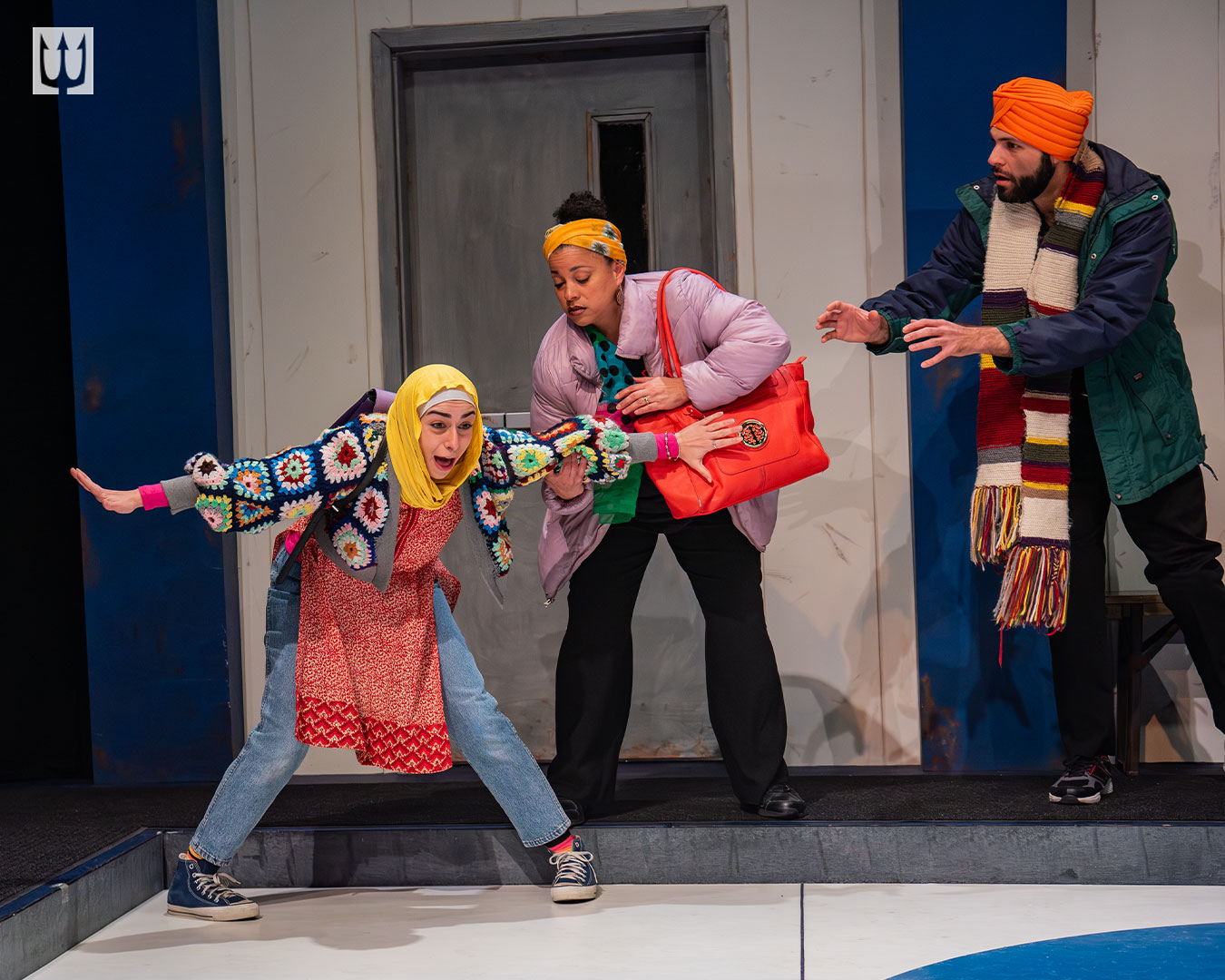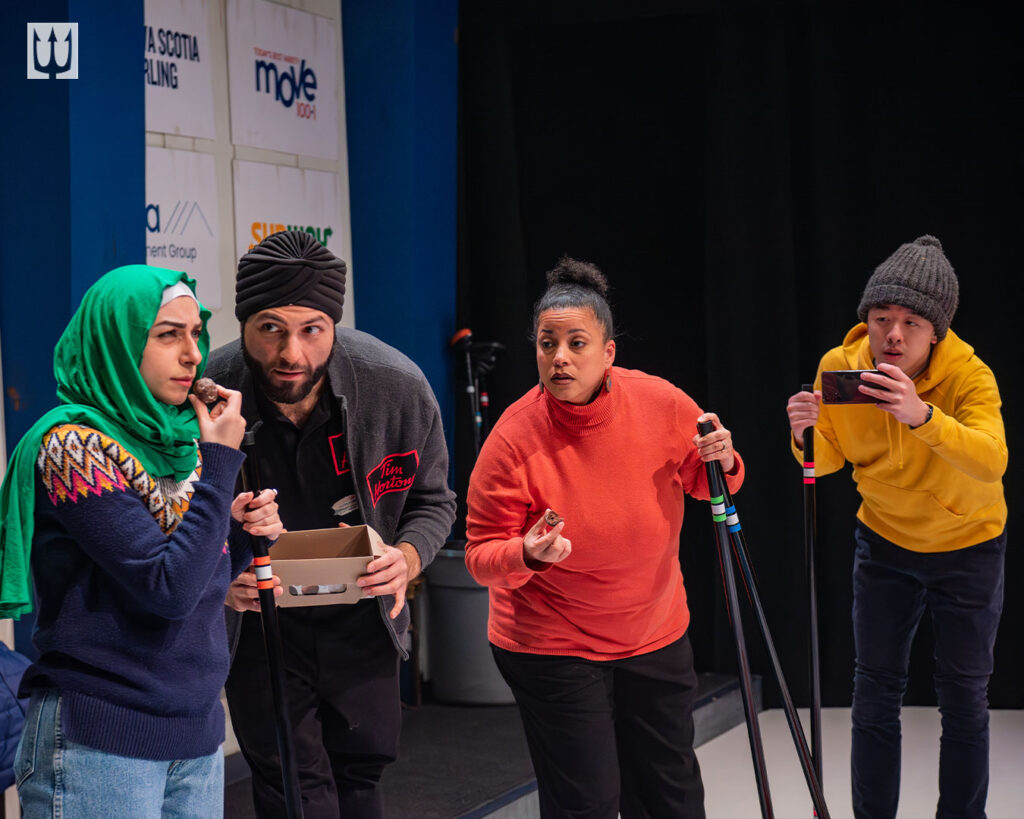
Zaynna Khalife's Fatima slips on the ice, while Linette Doherty (Charmaine) and Ardavan Taraporewala (Anoopjeet) rush to help. Photo by Stoo Metz.
Obviously when Jeremy Webb programmed Mark Crawford’s play The New Canadian Curling Club in this slot in the Neptune Theatre 2024-25 season, he couldn’t have been able to foresee how glaringly relevant the play would be in our current political hellscape. The play closes soon, on March 23rd, 2025, and has been selling very well.
The play premiered in the summer of 2018 at the Blyth Festival in Ontario, and originally was set in a small Ontarian town, but it is flexible, I’m sure by design, so this production takes place in a small unidentified Nova Scotian town. The flexibility of this story being able to be adapted to suit all ten provinces showcases the fact that increased immigration to small towns that had previously, for centuries, been made up of the descendants of settlers from a mix of places in the United Kingdom and Europe, is an experience that folks across the country share.
Marlene is, by all accounts, a nice white lady who is trying to organize an event to help recent immigrants in her small town feel both welcome, and in a way, initiated into Canadian culture by coaching a Learn-to-Curl event at the local curling club. Unfortunately, when Marlene becomes injured on the ice the coaching job falls to her cankerous ex-husband Stuart MacPhail, who already feels defensive about newcomers coming into his town, being “given handouts,” and thus “stealing” opportunities (and jobs) away from the locals. Stuart is stuck with this gig, however, because his granddaughter’s boyfriend is one of the few participants, and Kate is adamant that her grandfather and Mike, who is Chinese, learn how to get along.
It’s fairly obvious where the play is headed, we assume there will be some sort of curling victory that coincides with Stuart confronting his racist and xenophobic ideas, and becoming more accepting of not just his granddaughter’s boyfriend, but all his new neighbours. Where Crawford shines is the way that he layers a lot of complexity and humanity into the way that the characters move throughout their weeks at the curling club.
Mike is a Chinese medical student in his residency looking to make Nova Scotia his permanent home. Charmaine is Jamaican, and has been living in this town for over twenty years. She manages the local Tim Horton’s and helped to sponsor the family of Fatima, a seventeen year old girl who just arrived in Canada from Syria. Fatima and her parents had to leave her brother behind, and she is desperate for him to escape from Syria and join them in Canada. Charmaine works with Anoopjeet, who is from India, and he and his wife have been in Canada nearly a decade, and are just scraping by raising their triplets. Crawford treats his characters with respect and compassion, making sure to not imply that just because Mike, Charmaine, Fatima, and Anoopjeet are all immigrants that their experiences are the same. He further explores the fact that none of the characters are immune to prejudice, and how, systemically, they are locked into a racist hierarchy that privileges some over others, especially when it comes to racist tropes like the “model minorities” stereotype. We also see that even Marlene’s idea of a curling team isn’t without its problems, as she seems to have vastly underestimated how many other responsibilities and distractions folks like Fatima and Anoopjeet have to just survive in their day to day lives. The play is written from a white perspective, and as a white theatre critic, it was important for me to keep that in mind as I watched the show. I appreciate the ways Crawford sought to root this story in the specificity of four distinct characters, but, as a play also written for the festival audience in a village in Ontario, I’m sure that it can be said that it is all wrapped up a bit too tidily in a bow.

Yet, it is also the actors who bring so much additional nuance to their characters. We are introduced to Ardavan Taraporewala ’s Anoopjeet as someone who is trying to meet everyone with a cheerfulness that often bleeds over into exuberance. You can see this as an over compensation; he is bringing so much friendliness in the hopes that he might get half as much back, while also constantly walking on eggshells, never knowing when someone is going to be overtly racist to him. Yet, as the play progresses, we see Anoopjeet drop the façade, both in the comfort of his friendships with Mike, Fatima, and Charmaine, but also in feeling empowered to call racism out overtly with Stuart and other (unseen) members of the curling community. Zaynna Khalife’s Fatima is also a bundle of chaotic energy, both in her frustration with not being able to easily and effectively express herself, her inability to understand what others are saying to her, and her frantic concern for her brother in Syria. Like Anoopjeet, Fatima wants to be liked, but she is also a teenager, who wants to be able to just be cool, and to have some independence. Charmaine, played by Linette Doherty, in contrast, brings all the exhaustion of a job that has her on her feet all day, while raising children in middle age. Yet, still she shows up. Still she sacrifices her rest to build community and to take care of others. Howard Dai’s Mike is very reserved. Like Charmaine, he barely has an accent, and even though he has been in Canada a much shorter time than she has, we see the ways in which he already has privilege because of the way he speaks, the fact that he’s in medical school, and his name, which he chose for himself in elementary school. Mike is being pulled between aligning himself firmly with his new friends, or seeking the approval of his girlfriend’s grandfather. Robert MacLean plays Stuart, and he reminded me so much of Maynard Morrison’s character Martin MacKinnon from the Cape Breton Summertime Revue. Martin is a pastiche of a rural East Coaster who usually represents what is seen as loveable, unique, and funny about older, rural Nova Scotians. For MacLean to be able to take a lot of what is very familiar about a character like Martin MacKinnon and infuse him into someone more overtly problematic like Stuart MacPhail, I think makes it impossible for white audiences here to distance Stuart from our own towns, our own relatives and neighbours, and our own experiences over the last ten years as our province has experienced rapid changes.
Lucas Arab has created a visual marvel with his highly realistic curling sheet set, on which the newcomers to the game struggle against faceplanting on the ice. It is so beautifully realistic, I wished that there had been a separate space for the few scenes that take place in the curling club bar. Santiago Guzmàn directs the piece, and especially shines in the way that he depicts each one of the curling games in a very specific montage so we can see the four players’ evolution with the sport over the ongoing weeks of their practices. Guzmàn makes excellent use of Jordan Palmer’s sound design and Ryan Rafuse’s lighting design to keep these moments from feeling repetitive or drawing out for too long, while also giving the audience a real sense of how the games are unfolding for the four players and their coach.
For me, what touched my heart the most about this play is that I think it does capture something that makes Canada great, and that is that there is room, more and more, in the conversations about Canadian identity and Canadian culture for us to admit that we are not perfect, but also to embrace the opportunity to be better and to do better as a country. We are not fixed. Our ‘greatness’ is certainly not behind us in some pined for past. We are becoming more and more pliable, open to change, willing to learn from the past, and really starting to pledge in earnest to make amends for past wrongs and to not repeat our past mistakes. Obviously, in the real world, not every Stuart MacPhail is going to be open to listen, or open to change, and often this change is much more incremental and takes much longer than can be depicted in a theatre piece, but Stuart does model what I think is for many a Canadian aspiration. In a similar way that Schitt’s Creek is aspirational, The New Canadian Curling Club is aspirational as well.
In a time when we are looking for stories, purposefully, that can make us proud to be Canadian, Santiago Guzmàn and Mark Crawford give us one that really makes audiences stand up and cheer.
The New Canadian Curling Club plays at Neptune Theatre’s Scotiabank Studio Theatre (1589 Argyle Street, Halifax) until March 23, 2025. Shows are this Thursday to Sunday at 7:30pm with 2:00pm matinees on Saturday and Sunday. Tickets range in price from $33.00 to $85.00 depending on seating. Tickets are available here, by calling 902.429.7070 or in person at the Box Office.
This show is approximately 2 hours & 25 minutes (including a 20 minutes intermission).
Please note: this show contains mature language, haze, and strobe (in one scene).
This show is recommended for ages 9+
Audio Described Performance
Saturday, March 22 – 2:00 PM
Neptune Theatre is fully accessible for wheelchair users. Neptune offers hearing-assistance devices, along with their masked performance and audio described performance. For more Accessibility Information Click Here.




 World Theatre Day: My God Is It Ever The Time to Invest in Canadian Plays
World Theatre Day: My God Is It Ever The Time to Invest in Canadian Plays 
